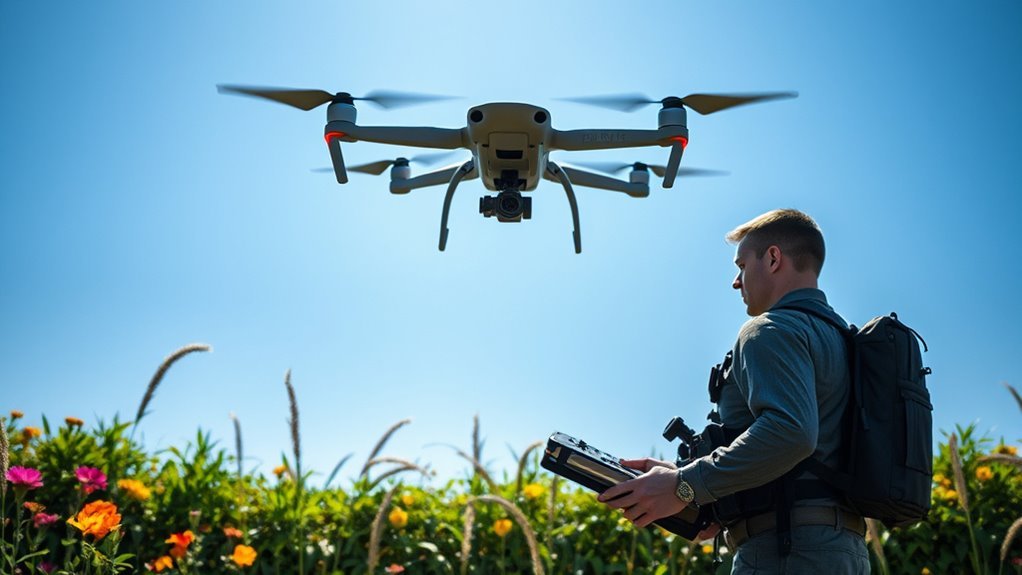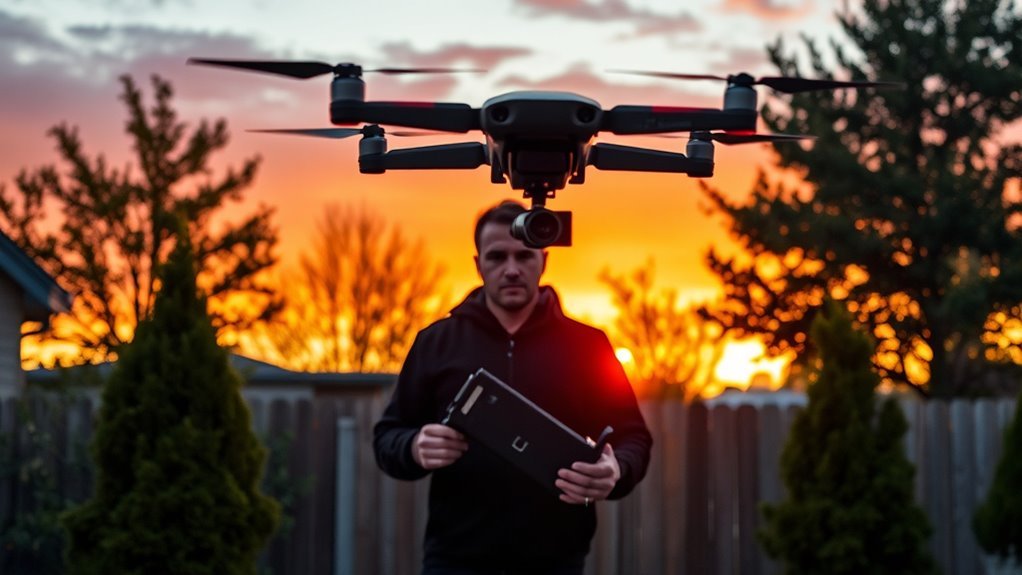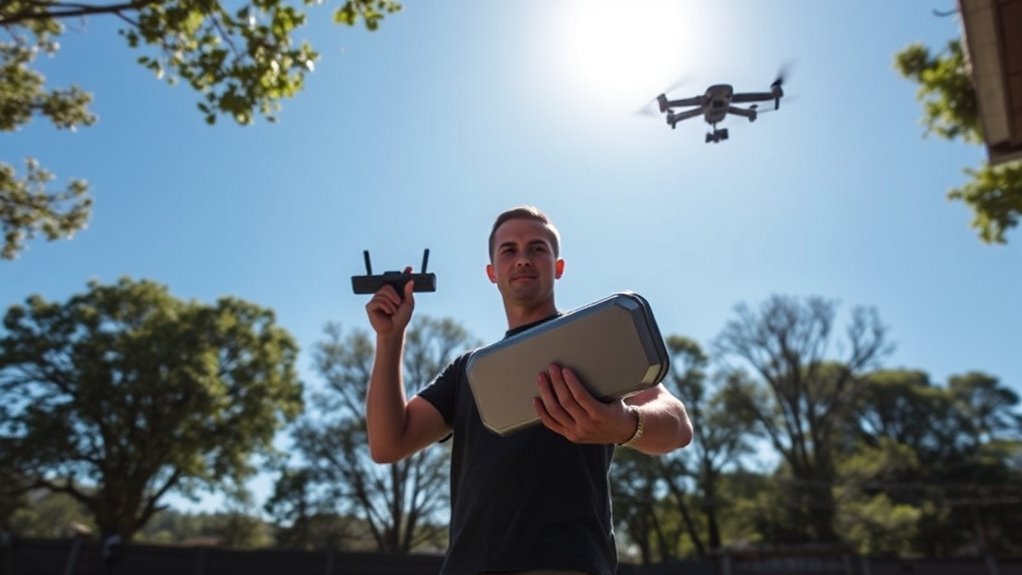Shooting down a drone, even if you think it’s spying on you, is illegal and can lead to severe consequences. Drones are classified as aircraft, and damaging or destroying one violates federal regulations. Instead, assess the situation and identify any unauthorized drone activity. You can report it to local authorities or use drone detection technologies for protection. Understanding your rights and local drone regulations can help you navigate this issue effectively, and there’s more to explore on protecting your privacy.
Understanding Drone Regulations and Your Rights

When considering your options for dealing with intrusive drones, it’s essential to understand the legal framework that governs their use. Drone laws vary markedly by region, and understanding these regulations is key to protecting your privacy rights. In many jurisdictions, drones are categorized as aircraft, subjecting them to specific operational restrictions. Unauthorized surveillance can infringe upon your privacy, yet responding to such intrusions requires caution. Engaging with these drones can lead to legal repercussions, as shooting them down typically violates airspace laws. It’s important to familiarize yourself with local drone regulations and your rights to guarantee that any actions taken are lawful and effective. Balancing privacy interests with legal compliance is fundamental in steering through this complex landscape. Additionally, awareness of restricted zones is crucial to ensure that any drone interactions do not lead to unintended legal violations. For example, understanding airspace classifications can provide clarity on where drones are permitted to operate legally.
Identifying Unauthorized Drone Activity

How can you determine if a drone is operating without authorization? Start by conducting personal privacy assessments to understand your surroundings and identify any unusual drone activity. Utilize drone detection technologies, such as RF scanners or visual identification methods, to spot drones that might be infringing on your airspace. Look for signs like low-flying drones, erratic movements, or persistent hovering near your property. Check if the drone operator is visibly present and whether they hold the necessary permits. Remember, authorized drones typically follow specific operational guidelines, while unauthorized ones often disregard these regulations. Being vigilant about these factors can help you ascertain if a drone poses a threat to your privacy and freedom. Additionally, keep in mind that federal government controls navigable airspace above personal property, which can help you distinguish between lawful and unlawful drone activities. Drones equipped with advanced battery technology can often fly longer, making it crucial to monitor their presence closely.
Reporting Drones to Authorities

If you suspect a drone is operating without authorization, reporting it to the appropriate authorities is a critical step. Understanding the reporting procedures outlined in local and federal drone laws is vital. First, gather as much information as possible about the drone, including its appearance, flight path, and any identifiable markings. Documenting this evidence can strengthen your report. You should contact your local law enforcement or aviation authority, providing them with the details you’ve collected. Many jurisdictions have specific forms or online portals for reporting unauthorized drone activity. By following these procedures, you not only protect your privacy but also contribute to a broader effort to guarantee compliance with drone regulations, fostering a safer environment for everyone. Additionally, be aware that drones like the XG Neith are equipped with advanced safety features, which can help authorities identify and address unauthorized operations efficiently.
Taking Preventive Measures for Your Privacy
While drones can enhance various activities, they also pose significant privacy risks, making it essential to take preventive measures. To protect your privacy, consider investing in drone detection systems that alert you when unauthorized drones are nearby. These systems often use radar and radio frequency technology, allowing you to identify potential intrusions effectively. Additionally, employing privacy tools like signal jammers or reflective materials can help mitigate surveillance risks. Regularly assess your surroundings for signs of drone activity and maintain awareness of local regulations regarding drone use, including the importance of designated areas for drone operation. By being proactive and using available technology, you can safeguard your personal space and maintain your freedom from unwanted surveillance, ensuring that your privacy remains intact in an increasingly monitored world. Understanding the permissible drone weights and regulations in your area is crucial for effective prevention against unwanted drone intrusions.
Exploring Legal Alternatives to Address Drone Issues
As drone technology becomes more prevalent, understanding the legal avenues available to address related issues is essential. Privacy laws vary by location, and knowing your rights can empower you to act appropriately. Here are some legal alternatives to reflect upon:
- Report unauthorized drones: Contact local authorities if you suspect drone surveillance.
- Document incidents: Keep a detailed record of drone activity to support potential legal claims, including noting drone behavior such as hovering or circling.
- Consult legal experts: Seek advice on privacy laws that might protect you from invasive drone use.
- Advocate for stronger regulations: Engage with community groups to push for enhanced privacy protections regarding drone technology. Additionally, being aware of local laws can help you understand your rights and take informed actions.
Exploring these options can help you protect your privacy while maneuvering through the complexities of drone-related concerns.
Frequently Asked Questions
Can I Shoot Down a Drone if It’s Over My Property?
Picture a hawk soaring above, yet you can’t just fire at it. Shooting down a drone over your property risks legal repercussions, as drone privacy laws often protect them, leaving you vulnerable to penalties.
What Penalties Could I Face for Shooting Down a Drone?
If you shoot down a drone, you could face significant legal repercussions, including civil liabilities. Courts may view this as destruction of property, potentially leading to costly fines or lawsuits from the drone’s owner.
How Can I Distinguish Between Commercial and Private Drones?
To distinguish between commercial and private drones, use drone identification techniques like inspecting their size, design, and features. Commercial drones often have specific markings, advanced sensors, and larger dimensions compared to private models, which are typically smaller and simpler.
Are There Specific Laws for Drones in My State?
You’ll need to research drone regulations specific to your state, as laws vary widely. Understanding these state laws is essential for ensuring you’re compliant while asserting your rights regarding drone use in your personal space.
What Should I Do if I Find Drone Debris on My Property?
If you discover drone debris on your property, consider your property rights carefully. Contact local authorities for proper drone disposal procedures, ensuring you adhere to regulations that might govern such incidents in your jurisdiction.

